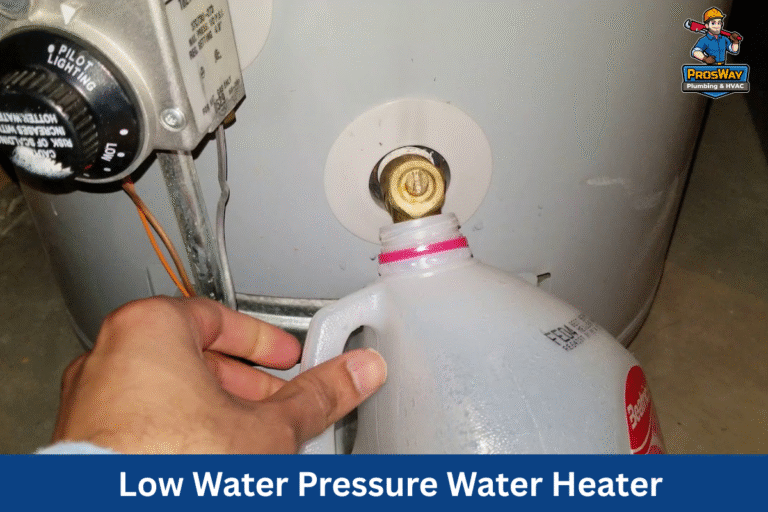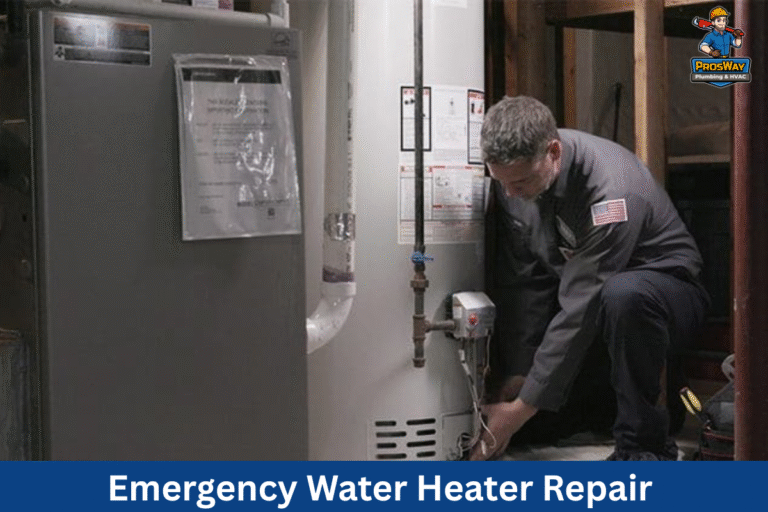Clogged sewer drains? Don’t worry—there are simple and effective ways to clean them, from DIY methods like hot water and baking soda to professional hydro jetting and camera inspections. At ProsWay Plumbing & HVAC, we help Northern New Jersey homeowners choose the right approach to keep their drains clear and plumbing running smoothly.
Signs You Need to Clean Your Sewer Drains
Before taking action, it is crucial to identify signs that your sewer drains are starting to clog.
What Do Slow Drains in Your Home Indicate?
When fixtures like the kitchen sink, shower, and bathtub drain slowly, it is a warning sign. Grease, food debris, hair, and soap scum may have built up, restricting water flow.
If water lingers after use, it may be time for cleaning. Slow drainage leads to water backups, mold growth, structural damage, and expensive repair services.
Many homeowners in Northern New Jersey have experienced these problems when drains are not cleaned regularly.
Acting early with methods such as plunging or home remedies can prevent further buildup and reduce overall stress on your plumbing system.
Unusual Gurgling Sounds From Pipes
Gurgling sounds in pipes indicate that air is trapped as water attempts to pass through an obstruction. They often signal that sewer gases are trying to escape through a clog.
Frequent gurgling paired with slow drainage should prompt an inspection using a hand-held drain auger or by consulting professional drain cleaning services.
Detecting Foul Odors Emanating From Drains
An unpleasant odor from your drains is a clear sign that bacteria and decomposing organic matter are building up inside the pipes. Ignoring these smells can lead to worsening clogs.
While air fresheners may mask odors, the underlying clog remains and might later require professional intervention. Pouring a baking soda and vinegar solution into the drain can temporarily reduce odors by initiating a chemical reaction.
Why Is Water Backing Up Into Fixtures?
Water backing up in fixtures indicates a significant obstruction in your sewer system. When water has nowhere to go, it carries contaminants back into your home and increases the risk of water damage.
Minor backups might be cleared with a plunger; however, persistent sewer backups suggest a severe blockage that may require a drain snake, power auger, or professional hydro jetting services.
How to Clean Sewer Drains Effectively Using Home Remedies?

Home remedies are a first line of defense against mild to moderate clogs. They are accessible, inexpensive, and simple to use without immediately calling in professional help.
Applying Boiling Water to Dissolve Grease Buildup
Boiling water helps dissolve grease and fat built up in pipes. Pour it slowly into the drain to break up and flush away grease. For best results, use this method as preventive maintenance.
Pour boiling water down your kitchen sink once a week. Adding a small amount of salt can further enhance its ability to break down buildup. Just be cautious with PVC pipes and use incremental pours to avoid burns or damage.
Why Use Baking Soda and Vinegar for Drains?
Mix one cup of baking soda followed by one cup of white vinegar into the drain. The fizzing reaction helps lift and break down soap scum, hair, and organic material.
Let the mixture sit for about 30 minutes, then rinse with hot water. This natural and eco-friendly solution works best on organic clogs and can be used routinely as preventive maintenance.
Proper Plunger Techniques for Dislodging Obstructions
A plunger creates suction to dislodge clogs from pipe walls. Ensure the sink, tub, or toilet has enough water to cover the plunger cup, then position it well over the drain and plunge vigorously.
Maintain a tight seal and use multiple strong thrusts to break apart soft clogs caused by hair or minor grease buildup. After plunging, follow with a rinse of boiling water to flush any remaining debris.
When Should You Use a Drain Auger?
A handheld drain auger uses a flexible, spiral cable that you feed into the drain. Slowly insert the cable until you feel resistance, then turn the handle to break up or hook the clog.
Work slowly to avoid damaging the pipes and, once the clog is cleared, run hot water through the drain to flush the debris. This tool is especially useful for reminding people that home remedies cannot be fully clear.
What Rented Tools Help Clean Sewer Drains?
For stubborn clogs not resolved by home remedies, rented equipment can offer a more powerful solution.
Selecting the Right Motorized Drain Snake for the Job
Motorized drain snakes are powered devices that use a rotating metal cable to break up and remove clogs deeper in the sewer line. Available for rent at many hardware stores, these tools are effective for both residential and light commercial systems.
When selecting one, consider the diameter of your pipes and the nature of your clog—whether it is grease, hair, or food debris. Read rental instructions carefully and use protective gear while operating the device slowly to avoid pipe damage.
How Do You Safely Use a Power Auger?
Power augers use high-powered rotation to loosen and break apart debris. Follow these instructions: Read the manufacturer’s instructions thoroughly and wear protective gear.
Position the auger near the clogged drain and remove standing water to reduce splashing. 3. Insert the auger cable slowly until resistance is felt.
Allow the auger to rotate and work through the clog without forcing it. Continue feeding the cable until the blockage is cleared. Withdraw the cable gently and flush the drain with hot water.
Following these steps minimizes the risk of pipe damage or personal injury while effectively clearing the clog. You can watch this video: EASIEST Way To Clear A Sewer Blockage – This Should Be In Your Toolbox.
Why Choose Enzymatic Cleaners for Drains?
Enzymatic cleaners use microorganisms and enzymes to break down organic material like fats, oils, and food residues. Pour the cleaner directly into the drain and allow it to sit for several hours.
Repeated applications can help with stubborn clogs. These cleaners are environmentally friendly, reduce unpleasant odors, and prevent buildup when used as part of regular maintenance.
Risks Before Using Strong Chemical Solutions
Strong chemical drain cleaners can work quickly but may also cause pipe corrosion and release dangerous fumes, especially in older plumbing systems.
Before using these chemicals, it is important to understand the risks and follow all manufacturer guidelines closely. Often, milder methods like mechanical cleaning or enzymatic cleaners are preferable for long-term plumbing health.
When Should You Call a Professional for Drain Cleaning?
When home remedies and rented equipment fail, professional sewer drain cleaning services may be necessary. Professionals use advanced equipment and techniques to clear even the most challenging blockages.
When Is Professional Intervention Necessary?
Call a sewer line contractor if multiple home remedies and rented tools have failed or if you notice persistent backups, foul odors, water damage, or mold near drain areas. Professionals diagnose underlying issues using advanced tools such as video inspections.
How Professionals Use Video Inspections to Diagnose Issues?
Professional plumbers use waterproof cameras attached to flexible cables to inspect the interior of your pipes. Video inspections help locate blockages and detect tree root infiltration.
This non-invasive method is effective for targeting the exact cause of a clog and determining whether additional repair services are needed.
The Power of Hydro Jetting for Thorough Drain Cleaning
Hydro jetting uses a high-pressure water stream to scour the interior of pipes, removing stubborn debris, grease, and even tree roots.
A specialized nozzle directs water at pressures up to several thousand PSI to dislodge the clog. Although highly effective, hydro jetting should only be performed by professionals to avoid damage to delicate pipes.
Why Do Professionals Handle Tree Root Infiltration?
Tree roots can infiltrate sewer lines and cause severe blockages. Professionals use mechanical cutting tools, often combined with hydro jetting, to cut through roots without damaging pipes.
In some cases, chemical treatments are then applied to prevent further root growth. Video inspections are used initially to confirm the presence and extent of root intrusion.
What Are the Best Ways to Prevent Sewer Drain Clogs Long-Term?

Establishing long-term strategies is essential to prevent future drain issues. These include regular cleaning, lifestyle changes, routine maintenance, and understanding your home’s plumbing layout.
The Impact of Landscaping on Sewer Lines
Landscaping can affect your sewer drains if tree roots extend into the pipes. Avoid planting trees with aggressive roots too close to your home.
If mature trees are already present, schedule regular inspections to monitor root growth and consider trimming or installing root barriers as needed. For further assistance, check our plumbing services.
Why Is Regular Maintenance Important for Drain Health?
Routine maintenance is key to preventing emergencies. Regular cleaning using home remedies combined with periodic professional inspections can remove debris before it forms major clogs.
Scheduling monthly or quarterly cleanings, along with annual deep cleans such as hydro jetting, helps extend the life of your sewer lines and prevents costly repairs.
Habits for Daily Drain Protection
Adopt daily habits to protect your drains. Use drain strainers, avoid disposing of grease in sinks, and do not flush non-degradable items. Running hot water for a few minutes after using the garbage disposal.
And cleaning drain guards regularly also helps keep pipes clear. These simple measures, consistently followed, can dramatically reduce clogged drains.
Why Should You Know Your Home’s Plumbing Layout?
The layout of your plumbing system is an important long-term strategy. Knowing where the main sewer line and branch lines are located enables you to diagnose problems quickly.
In older homes where plumbing diagrams may not be available, consider having a professional map the system. This knowledge is useful during emergencies and for planning routine maintenance.
List of Daily Preventive Measures
- Install Drain Strainers – Efficient Protection: Use drain strainers in sinks, tubs, and showers to capture hair, food particles, and debris. Clean them regularly.
- Dispose of Grease Properly – Prevent Hardening: Collect grease in a container and dispose of it in the trash instead of washing it down the sink.
- Run Hot Water After Each Use – Keeps Pipes Clear: Flush drains with hot water after use to help prevent buildup.
- Avoid Flushing Non-Degradable Items – Protects Sewer Lines: Educate household members not to flush items like baby wipes, sanitary products, and paper towels.
- Use Enzymatic Cleaners Monthly – Natural Maintenance: Apply an enzymatic drain cleaner monthly to break down organic residue.
- Regularly Clean Drain Guards – Minimizes Clogging: Wash drain guards frequently to avoid buildup.
- Monitor Water Flow – Early Detection: Check the flow from your drains regularly and address any slowdowns immediately.
Daily and Long-Term Drain Maintenance Strategies
| Measure | Function | Benefit | Recommendation |
|---|---|---|---|
| Install Drain Strainers | Captures debris | Prevents clog formation | Clean weekly |
| Dispose of Grease Properly | Avoids grease buildup | Reduces the risk of hard clogs | Use a container, and discard in the trash |
| Run Hot Water After Use | Flushing residual buildup | Maintains free-flowing drains | Run for 2-3 minutes after each use |
| Avoid Flushing Non-Degradable Items | Prevents unintended clogs | Protects sewer lines | Educate household members |
| Use Enzymatic Cleaners Monthly | Breaks down organic residue | Natural, eco-friendly maintenance | Apply once per month |
| Regularly Clean Drain Guards | Removes trapped debris | Avoids accumulated blockages | Clean after heavy use or weekly |
| Monitor Water Flow | Early detection of slow drains | Prevents major clogs quickly | Inspect monthly |
| Schedule Professional Inspections | Identifies hidden issues | Reduces emergency repairs | Every 12-18 months |
Frequently Asked Questions
How often should I use home remedies like boiling water and baking soda in my drains?
Use these remedies at least once a week as preventive maintenance. Boiling water dissolves grease buildup, while a baking soda and vinegar solution helps break down organic matter, reducing the risk of major clogs.
What are the risks of using strong chemical drain cleaners on my plumbing?
Strong chemical cleaners can corrode pipes, especially in older systems, and may produce harmful fumes.
They often provide a temporary fix and can cause long-term damage, so milder methods are usually preferable. You might consider more eco-friendly alternatives, like homemade drain cleaners.
How can professional video inspections help in maintaining my sewer drains?
Video inspections allow professionals to view the inside of your pipes, pinpoint blockages, detect corrosion, and identify tree root problems. This accurate diagnosis guides proper cleaning or repair methods and prevents major emergencies.
What should I do if I suspect tree root infiltration in my sewer drain?
If you suspect tree roots have infiltrated your drain, call a professional plumber for a video inspection. They can safely remove the roots and recommend measures such as root barriers to prevent further intrusion.
Are daily preventive measures enough to keep my sewer drains clear, or do I need professional maintenance too?
Daily preventive actions are essential, but regular professional maintenance and inspections are also necessary, especially in older homes, to ensure overall system health and avoid costly emergency repairs.
Final Thoughts
Maintaining clear sewer drains requires proactive steps, from recognizing early signs of clogs and using home remedies to employing rented equipment and professional services as needed. A combined approach using boiling water, baking soda, and vinegar, proper plunging techniques, and advanced tools like motorized drain snakes or hydro jetting helps clear even the most stubborn clogs. By staying informed and proactive, you can keep your home’s plumbing system in excellent condition and protect your investment.
Act Now to Keep Your Drains Flowing! Call ProsWay
Don’t wait for a backup to strike—schedule your sewer drain cleaning with ProsWay Plumbing & HVAC today. Whether it’s routine maintenance or a stubborn clog, our expert team in Northern New Jersey is here to help. Call us now at (862) 260-5870 or Book Online for fast, reliable service!








